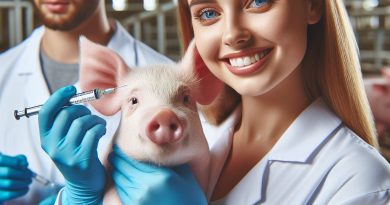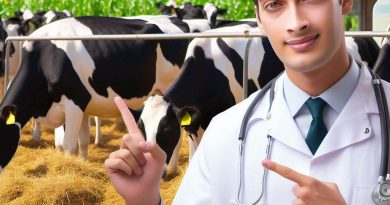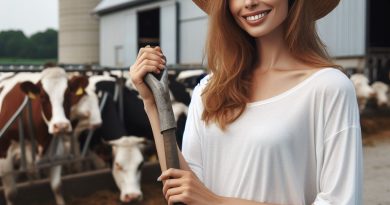Essential Pig Nutrition for Growth
Last Updated on March 2, 2024
Introduction
A. Importance of pig nutrition for growth
Pig nutrition plays a crucial role in ensuring optimal growth and overall health.
Providing the right balance of nutrients is essential for pigs to reach their full growth potential and maintain strong immune systems.
B. Overview of the blog post
This blog post aims to shed light on the importance of pig nutrition for growth.
We will explore the key elements required for a pig’s diet, discuss the benefits of proper nutrition, and provide practical tips for farmers and pig owners to ensure their pigs receive the necessary nutrients for healthy growth.
By understanding the significance of pig nutrition and implementing appropriate feeding strategies, farmers can maximize the growth potential of their pigs, reduce the risk of illnesses, and improve overall production efficiency.
So let’s delve into this topic and discover the secrets to achieving optimal pig growth through nutrition.
Read: Effective Pig Housing Solutions
Nutritional Requirements for Pig Growth
A. Energy requirements
Pigs require sufficient energy in their diet to support growth and development.
The main sources of energy in pig nutrition include carbohydrates, fats, and oils.
1. Sources of energy
Carbohydrates are found in grains and other feed ingredients like corn, barley, and wheat.
Fats and oils, on the other hand, are commonly derived from soybean meal and other oil-rich plants.
2. Recommended energy levels
The recommended energy levels for pig growth vary depending on the pig’s age, weight, and activity level.
Younger pigs generally require more energy to support their rapid growth compared to older ones.
B. Protein requirements
1. Role of protein in growth
Protein is a vital component of a pig’s diet as it plays a major role in growth and development.
It is responsible for building and repairing body tissues, producing enzymes and hormones, and supporting the immune system.
2. Sources of protein
Common sources of protein in pig feed include soybean meal, fish meal, and meat and bone meal.
These ingredients are highly digestible and provide essential amino acids that pigs need for proper growth.
3. Recommended protein levels
The recommended protein levels in a pig’s diet depend on factors such as age, weight, and desired lean muscle mass.
Generally, a higher protein content is needed during the early stages of growth and can be gradually reduced as the pig matures.
C. Vitamin and mineral requirements
1. Role of vitamins and minerals in growth
Vitamins and minerals are essential for pig growth as they are involved in various physiological processes, including immune function, enzyme activity, and bone development.
2. Essential vitamins and minerals
Some of the essential vitamins for pigs include vitamin A, D, E, and K, which can be obtained from sources like green leafy vegetables and fortified feed.
Similarly, minerals such as calcium, phosphorus, and zinc are crucial for skeletal development and overall health.
3. Recommended vitamin and mineral levels
The recommended levels of vitamins and minerals in a pig’s diet should be based on the specific requirements of the pig’s age, weight, and production stage.
Consulting a nutritionist or veterinarian can help ensure the correct supplementation.
Generally, meeting the nutritional requirements for pig growth is crucial for maximizing productivity and ensuring optimal health.
Providing the right energy, protein, vitamins, and minerals in the pig’s diet will support growth, muscle development, and overall well-being.
Regular monitoring and adjustment of the diet based on the pig’s growth stage are essential for achieving desired outcomes.
Read: Swine Flu: Protecting Your Pig Herds
Discover More: Breeding Tips for Sheep: A Starter Guide
Feeding Strategies for Optimal Growth
A well-planned feeding strategy is crucial for optimal pig growth and development.
This section highlights different feeding strategies and considerations for each stage of a pig’s life, including starter diets, grower/finisher diets, and water management.
A. Starter diets
Starter feeds play a critical role in piglet nutrition.
These diets are formulated to provide the necessary nutrients for piglets during the early stages of their life.
1. Composition of starter feeds
Pig starter feeds should contain a balanced mix of nutrients such as proteins, carbohydrates, and fats that are easily digestible.
The composition of starter feeds is carefully balanced to meet the specific nutritional requirements of growing piglets.
These feeds typically contain a mix of proteins, carbohydrates, and fats that are easily digestible.
2. Benefits of starter diets
Starter diets provide piglets with the essential nutrients needed for their rapid growth and development.
The benefits of starter diets are immense.
Piglets fed with starter feeds experience improved growth rates, enhanced immune function, and better overall health.
The nutrients present in these diets support muscle development, bone formation, and organ growth.
Additionally, starter feeds help piglets transition smoothly from a liquid-based diet to solid feeds, preparing them for the next stage of growth.
3. Feeding recommendations
It is recommended to provide piglets with starter feeds from weaning until they reach a certain weight or age, typically around 8 weeks.
The amount of feed should be gradually increased during this period.
Feeding recommendations for starter diets involve providing piglets with these feeds from weaning until they reach a certain weight or age, usually around 8 weeks.
During this period, the amount of starter feed should be gradually increased to meet the growing piglets’ nutritional needs.
B. Grower and finisher diets
As piglets grow older, their nutritional requirements change.
1. Composition of grower/finisher feeds
Grower/finisher feeds have a different nutrient composition compared to starter diets, with lower protein content and higher levels of fiber to support steady growth.
Grower and finisher diets are designed to support steady growth and development during these stages.
The composition of these feeds differs from starter diets, with lower protein content and higher levels of fiber.
2. Transition from starter to grower/finisher diets
Pigs should be gradually transitioned from starter to grower/finisher diets to prevent digestive upsets.
This transition should occur over a period of 1-2 weeks.
To transition from starter to grower/finisher diets, pigs should be gradually introduced to the new feed over a period of 1-2 weeks.
This helps prevent digestive upsets and allows pigs to adapt to the new diet.
3. Feeding recommendations for different growth stages
During the grower stage, pigs should be fed a diet that promotes weight gain, while the finisher stage requires a diet that ensures the pig reaches its final market weight without excessive fat deposition.
Feeding recommendations for different growth stages are important.
During the grower stage, pigs should be provided with diets that promote weight gain and muscle development.
These feeds are higher in proteins and energy.
On the other hand, the finisher stage requires a diet that ensures the pig reaches its final market weight without excessive fat deposition.
The feeds during this stage have lower energy levels.
C. Water management
1. Importance of water for pig growth
Water is essential for pig growth as it plays a crucial role in digestion, nutrient absorption, and temperature regulation.
Water is a vital component of pig nutrition and plays a crucial role in growth and development.
Pigs require access to clean, fresh water at all times. It is essential for the digestion and absorption of nutrients, temperature regulation, and overall health.
2. Water quality and availability considerations
Pigs should have access to clean, fresh water at all times.
The sources should be regularly checked for impurities and appropriate measures should be taken to ensure water is of high quality
Water quality and availability should be carefully considered.
Water sources should be regularly checked for impurities, and measures should be taken to ensure the water is of high quality.
Proper water management is necessary to avoid water-borne diseases and dehydration, which can severely impact pig growth and performance.
In general, feeding strategies for optimal pig growth involve providing starter diets, carefully transitioning to grower/finisher diets, and ensuring proper water management.
These strategies, combined with appropriate feeding recommendations for each growth stage, contribute to the healthy growth and development of pigs.
Read: Advancements in Veterinary Diagnostic Tools

Gain More Insights: Rotational Grazing: A Complete Guide
Common Nutritional Deficiencies and Their Impact on Growth
Proper nutrition is essential for the growth and development of pigs.
They require a balanced diet that provides all the necessary nutrients for optimal growth.
However, there are common nutritional deficiencies that can have a significant impact on their growth.
In this section, we will explore these deficiencies, their symptoms, effects, as well as prevention and treatment methods.
A. Lack of energy
A lack of energy is a common nutritional deficiency that can impede pig growth.
- Symptoms and effect: When pigs do not receive enough energy from their diet, they may exhibit symptoms such as reduced physical activity and slow or stunted growth. This deficiency can have a detrimental effect on their overall development and productivity.
- Prevention and treatment: To prevent and treat this deficiency, it is crucial to provide pigs with a diet that is rich in high-quality energy sources such as grains and fats.
B. Protein deficiencies
Protein deficiencies are another type of common nutritional deficiency that can hinder pig growth.
Pigs require a sufficient amount of protein in their diet to support muscle development and growth.
- Symptoms and effects: When they do not receive enough protein, they may experience symptoms such as reduced appetite, poor muscle tone, and delayed growth.
- Prevention and treatment: To prevent and treat protein deficiencies, it is important to provide pigs with a diet that contains a balanced amount of high-quality protein sources such as soybean meal or fish meal.
C. Vitamin and mineral deficiencies
Vitamin and mineral deficiencies can also have a significant impact on pig growth.
Pigs require a range of essential vitamins and minerals for various bodily functions and growth processes.
- Symptoms and effects: When they lack these nutrients, they may exhibit symptoms such as reduced immunity, poor bone development, and impaired reproductive performance.
- Prevention and treatment: To prevent and treat vitamin and mineral deficiencies, it is essential to include a well-formulated premix or dietary supplements in their feed, ensuring they receive adequate amounts of vitamins and minerals.
In essence, common nutritional deficiencies can significantly affect pig growth and overall productivity.
Lack of energy, protein deficiencies, and vitamin and mineral deficiencies are among the most prevalent deficiencies observed in pig nutrition.
It is crucial for pig farmers to be aware of these deficiencies, their symptoms, and effects, as well as the appropriate prevention and treatment methods.
By providing pigs with a well-balanced diet that meets their nutritional requirements, farmers can ensure optimal growth and development, ultimately leading to healthier and more productive pigs.
Read: Biosecurity in Livestock Farms: Key Practices
Conclusion
A. Recap of key points discussed
The blog section emphasized the crucial role of pig nutrition in growth.
We explored the importance of providing pigs with a balanced diet and meeting their specific nutritional needs.
B. Emphasis on the importance of pig nutrition for growth
It is evident from the discussion that proper nutrition is vital for optimal pig growth, muscle development, and overall health.
Neglecting nutrition can result in stunted growth, poor performance, and increased susceptibility to diseases.
C. Call to action for farmers to prioritize pig nutrition
Farmers should recognize that investing in high-quality nutrition for their pigs is a strategic move.
By working closely with animal nutritionists and using research-based feeding programs, farmers can maximize growth potential, minimize health issues, and ultimately improve the profitability of their pig farming operations.


